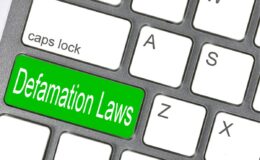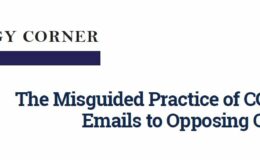Florida Supreme Court Allows Judges to be Facebook Friends With Lawyers But Four Justices Disagree With the Practice (“I write to strongly urge judges not to participate in Facebook”)
- By : Cbh
- Category : Ethics, Social Media

The Florida Supreme Court resolved a conflict between two intermediate appellate courts when it determined that a judge-lawyer “Facebook friend” relationship, alone, was not enough to warrant recusal of the judge. The Court deemed its position was the majority position around the country. However, four justices noted that caution, if not abstention, was the better course of action.
The case is Law Offices of Herssein and Herssein, P.A. v. United Services Automobile Association.
The decision is a quick read, so we will not dwell.
To force recusal of a judge, it is a longstanding rule that the following relationships between judges and lawyers/litigants are NOT enough: friends, neighbors, members of the same church, and fraternity brothers. With that in mind, it is not surprising, in 2018, that the Court correctly concluded, “an assumption that all Facebook friends rise to the level of a close relationship that warrants disqualification simply does not reflect the current nature of this type of electronic social networking.”
Stated differently, being Facebook friends does not mean that you’re friends. This is an obvious statement in 2018 which was not necessarily so clear, say, in 2010 or even as late as 2013. In a sentence taken from a New York case, “one can be Facebook friends with people known to them, strangers, with celebrities, with animals and with inanimate objects.”
The complication is that, back in 2010, Florida’s JEAC held that it was unethical for a judge to be Facebook friends with a lawyer who appeared before the judge. How 2010, amiright? That ethics committee doubled, if not tripled down on that concept, later claiming that Twitter and Linkedin connections likewise led to the same outcome. The Florida Supreme Court held “that concern is unwarranted.”
Still, as mentioned, the concurrence, which was barely a concurrence, started with the admonition, “I write to strongly urge judges not to participate in Facebook.” In short, technically you are fine but “misperception is all too easy.” The dissent goes that extra step: “… recent history has shown that a judge’s involvement with social media is fraught with risk…” That’s a reference to Judge Santino, who was removed from the bench by the Court for Facebook-related antics (see here). Other examples, like this one back in June, are not hard to find.
I generally agree that being “Facebook friends” is meaningless but that, as of 2018 and per the concurrence, a judge participates at some risk. The decision makes reference to some steps from other states to mitigate the risk. There are some good ideas out there and Facebooking judges should consider them carefully.
I don’t believe, however, that lumping all social media platforms together is a good idea (which is what the JEAC did) because the method and meaning of those connections differ across Facebook, Twitter, and Linkedin — and lumping the analysis together does not scale very well as we anticipate newer versions of social media networking will certainly come along.
This case will not be the last we have of this topic. Judges and judicial candidates will continue to use social media. It is not that hard for a party moving for recusal to rely on a social media connect and some other facts. These are fact-driven, case-specific decisions. As such, it is foreseeable that social media-fueled recusal claims will lay ahead of us.


